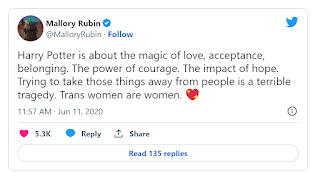Although I haven't been very active on this blog for a while, I was astonished to find that my hit counter is approaching a million hits. This makes it, by far, the most popular thing I have ever written.
(If you come across this blog somewhere and wonder if it's still active, it is. You can comment on any post, no matter how old, and I will respond. I think some of my previous posts need a little bit of a revisit though).
I had to write a post to commemorate this astonishing outcome. When I started this blog (in 2011!), it was because Vivienne was trapped. I couldn't dress openly; I had never been out dressed; I had never met other trans people. My makeup and dress sense were awful. I was aching to be free, and I was frustrated and miserable. My only outlet for my feminine feelings and identity was the Internet, which is where I really began to understand how many, many other trans people are out there.
One divorce later, and I began to take my first steps as Vivienne in the real world. With the help and support of my partner (who has chosen the name Missy for this blog), I began to try different looks, and to experiment with makeup. I had my first few (terrifying) outings in public. Although I was expecting uncomfortable confrontations, I have literally had not a single problem ever, and this has boosted my confidence enormously.
 |
| One in a million: selfie |
The Look
One of the things which is most important to work on is obviously the look. Coincidentally, one million is approximately the number of selfies I have taken. It certainly feels like that, anyway!
I love to smile in selfies. First, because I'm naturally a smily person. Second, because I think smiling is attractive. I don't always smile, but my attempts to look thoughtful, emotive, alluring, or just deep and meaningful, don't usually turn out well!
I don't use filters on my selfies, although I do use the Portrait mode on my iPhone, which subtly alters the colour balance in the photographs to make the image more flattering (and blurs the background).
And of course, I never used to post actual selfies on this blog; only ones which were incredibly blurry and therefore unrecognisable, such as on this page.
Milestones
This week, apart from my hit count, I have been reflecting on how many milestones I have achieved since I first spread my wings. A few short years ago, many of these experiences would have seemed impossible, and yet every one, both great and small, is precious.
Coming Out. I literally used to keep a spreadsheet of people who knew about Vivienne. It had three columns: knew my real name/job, had seen a picture of me, had met me in real life. This was my way of keeping track (at the insistence of my ex-wife) of the people who knew, so that a tight lid could be kept on everything.
While I'm still wary of coming completely out at work, friends have suggested (semi-jokingly) that I should just turn up for work one day dressed as Vivienne and have fun with everyone's reactions. I'm not there yet, folks! But I do comfortably admit to people that I'm a doctor (something I previously kept concealed) because I was terrified of being outed and the unwelcome consequences this might bring. I'm part of my hospital's Rainbow Network, and I'm a member of Pride in Medicine and PATHA. There are now lots of people at work who know about my double life--and I theirs!
I've even been on the stage as Vivienne, talking about my experiences as a junior doctor.
I'm very nearly at the stage where I would be comfortable encountering someone in a public place who doesn't know. I've already had a couple of near-misses, and my fem social life is frequent enough that it seems inevitable that this will occur. If it does, I will be sure to let you know how it goes!Clothing. At first, all my clothing was bought at charity shops, or online. It was a bit of a lottery about what would look good and what wouldn't. Obviously I do worry, because my underlying chassis is (let's be honest) a dad body, complete with paunch, and I need flowing, flattering clothes to try to hide it. I don't have any sleeveless dresses. But I do have some trans-specific shapewear to help make my silhouette more convincing.
Now, not only do I have a really lovely wardrobe with lots of options (casual, cosy, glam), but I'm completely comfortable buying Vivienne clothes and shoes (God, I love shoes!) in stores, either dressed or not. And along with clothing, I have actual jewellery; not plastic costume jewellery, but rings, bracelets, necklaces and earrings which I have chosen just for me! Getting my ears pierced was a big step here: I felt incredibly vulnerable going into work with my new, very subtle studs, but at weekends I can finally wear beautiful dangly earrings and enjoy the feeling!
Makeup and Hair. Again, makeup was a journey, and it's one I'm not finished. I have a daytime look which works, and an evening look which works, but I'd like to be able to be more versatile with makeup. I still find my skin gets oily, despite the use of primer, foundation, setting powder and then setting spray. There must be a solution out there!
I've had a couple of makeovers, and I've made a couple of appointments with a makeup artist, who has been really good at helping with specifics like eye liner and rouge. That (plus a lot of practice) has made a huge difference. After many appointments with the lovely woman who waxes my legs, she was keen that I should turn up dressed for an appointment, and so I did, and it was lovely.
I know this might sound a bit strange, but one of the things I noticed about dressing much more often is running out of cosmetics. Previously I dressed so rarely that cosmetics basically never ran out. Only in the last week I've had to buy more lip liner and an eyebrow pencil, because the ones I used have run out. I'm not quite going through a bottle a week of liquid foundation, but it's pretty close!
Along with makeup, I've also been to a wig specialist, who helped me choose a lovely wig (in the pictures) which is a good colour match for me, and is a lovely, feminine and flattering style. I now have a small collection of wigs.
Social Life. This year we had Pride Month, as usual. I went along to the local Pride Pub Quiz, but unfortunately I was late to sign up, so I didn't have a team. I hoped to join in with some other people who I knew, but the organisers were strict that it was only six people to a team. Not to worry, they said: there are other people who haven't got a team, so we'll stick you in a group together.
It was five women and me; we had never met before, but we got on like a house on fire and they treated me like one of the girls. We've had several social events (one just this week) for catchups, dinner and drinkies and general girly gossip. I can't tell you how incredibly affirming this is. At this week's dinner I got chatting to a woman at a neighbouring table, and she just chatted away as if I was just another woman. Pink fog!This lovely group comes on top of all the other social events, with Pride, Queer Women, and all the rest. Someone hold me back!
Blog Statistics
- The USA, with 367K views. No surprises there.
- The UK, the country of my birth, with 125K hits.
- Russia, with 77.7K views. I'm not sure how restricted the access to the internet is in Russia, but I take these hits as good news. Despite what Mr. Putin is trying to do, there are doubtless many, many LGBTQI+ people in Russia keeping their heads down and trying to get through. To all of you I say: Будьте сильны и знайте, что вы не одиноки.
- Germany, with 40.7K votes. Viel Spaß mit Ihrem Lippenstift, meine Damen!
- France, with 34.1K votes. Cherchez la femme!
- Canada, with 33.9K votes. This is beginning to feel like Eurovision. La Norvège? Nul points!
- Singapore, a surprise entry for such a small country, with 27.1K votes. Hello Singapore! You've done a lot better than my own country, New Zealand, with only 3.11K votes!
- Hong Kong, with 21.6K votes.
- Australia, with 14.5K votes. Kylie, I still think you're gorgeous.
- And bringing up the rear we have Brazil, with 11.6K votes. Is it true that you've all got to do that thing? You know, down below? Is it the law?
The ten most popular pages, in order, are these. It's curious that so many of these very popular posts are among my older work (in fact, none of them are newer than 10 years!!). This possibly represents the fact that the rate of hits (and posts!) is gradually declining (with the occasional uptick), which is my fault because I don't post often enough to keep people coming back!
Feel free to check out these popular posts, although I have to say that I think some of my less well-trodden posts are definitely worthy of your attention too!
- Women Who Crossdress, with 19.4K hits. It's interesting that this post should be so high up the popularity charts. Back in 2016 it was only in 4th place. Clearly this is a subject which keeps people interested!
- Emma Ballantyne, with 17.5K hits, and if we add the other post, Emma Ballantyne Speaks, with 7.72K hits, we would have 27K hits, making Emma the absolute winner. This is no surprise; I'm sure her popular YouTube channel (still active, still amazing) has admirers looking on the web for more info about her. Emma is up from 7th position last time.
- Men With Long Nails, with 15.7K hits. Another long-time favourite, up from 6th position.
- Jan Hamilton, with 14.1K hits. Now known as Abigail Austen, she was my previous Number One post.
- Jaye Davidson, with 13.2K hits. Jaye's beautiful androgynous appearance (beautiful as a woman or a man) fascinated audiences, but his disappearance from the public eye seems only to have intensified interest in him.
- Men in Skirts. 12.6K people are interested in why men would wear skirts.
- Leah True, with 11.6K hits. She remains perennially popular (number 5, back in 2016), and I would love to do an interview with her. If anyone knows her, please ask her to get in touch!
- Female Bodybuilding is still popular. In 3rd position last time, it's still going strong (!) with 10.1K hits.
- Pete Burns, is a new entry with 8.64K hits.
- This would also have been Emma Ballantyne, but instead I'm giving this place to my interview with the extraordinary Helen Boyd, with 5.88K hits.



























